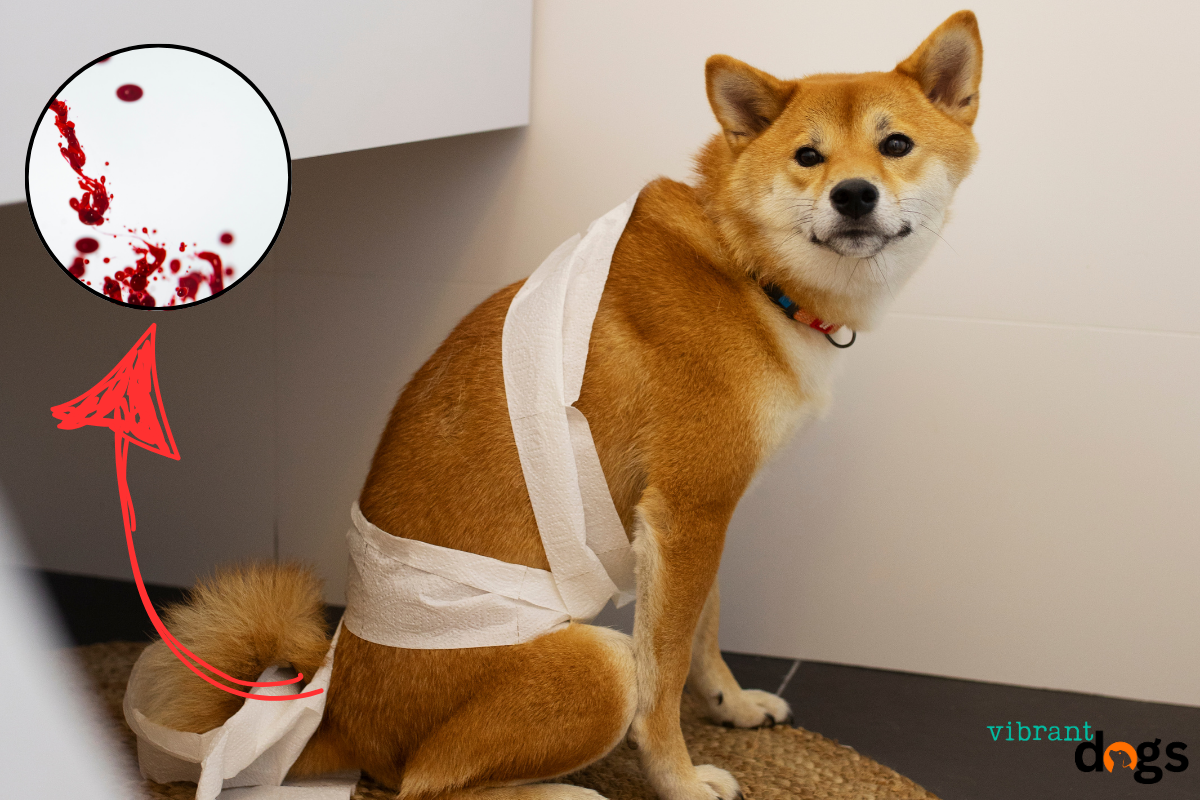If your dog is pooping blood, it’s a worrying sight. But, staying calm and acting quickly is key. This guide will help you understand why it happens, how to spot the signs, and what to do next to keep your dog safe.
Key Takeaways
- Blood in dog stool can mean many things, from small issues to serious health problems.
- Look at the blood type and any other symptoms to help your vet figure out what’s wrong.
- Get your dog to the vet fast if they seem really sick, tired, or won’t eat.
- Do what your vet says, which might include medicine, special food, or sometimes surgery.
- Keep your dog healthy with good food and regular vet visits to avoid future problems.
Understanding Blood in Dog Stool: Causes and Types
Seeing blood in your dog’s stool can be scary. But knowing the different types of blood can help. It’s key to tell fresh blood from digested blood to figure out what’s wrong and get help.
Fresh Blood vs. Digested Blood in Stool
Fresh blood is bright red or has clots. It usually means bleeding from the lower gut, like the rectum. Digested blood is dark and comes from higher up, like the stomach.
Common Causes of Bloody Stool
- Inflammatory bowel diseases, such as colitis or irritable bowel syndrome
- Parasitic infections, including giardia or hookworms
- Tumors or growths in the digestive tract
- Dietary indiscretion or food allergies
- Trauma or injury to the rectal area
- Clotting disorders or anticoagulant medication
Risk Factors and Warning Signs
Some dogs are more likely to have bloody stool. This includes older dogs, those with health issues, and certain diets. Watch for signs like tiredness, not eating, vomiting, or belly pain.
If you see blood in your dog’s stool, get vet help fast. Early treatment is key to keeping your dog healthy.
| Cause | Description | Appearance of Blood |
|---|---|---|
| Inflammatory Bowel Disease | Chronic inflammation of the digestive tract | Bright red, streaked, or mixed with stool |
| Parasitic Infection | Intestinal parasites like giardia or hookworms | Bright red, fresh blood |
| Digestive Tract Tumors | Abnormal growths in the stomach or intestines | Dark, tarry, or digested blood |
| Dietary Indiscretion | Consumption of something irritating or harmful | Bright red, streaked, or mixed with stool |
| Rectal Trauma | Injury or damage to the rectal area | Bright red, fresh blood |
| Clotting Disorders | Issues with the body’s ability to clot blood | Bright red, fresh blood |
Dog Pooping Blood: When to Take Immediate Action
When your dog has blood in their stool, watch closely, even if they seem acting normal. Some cases of blood in puppy stool might not need quick vet visits. But, some situations need fast action to keep your dog safe.
Big amounts of fresh, bright red blood in the stool are a big worry. It could mean a serious problem like a bleeding ulcer or a tear in the intestines. These issues can be very dangerous if not treated right away.
Also, if your dog’s stool has blood and they’re vomiting, tired, not eating, or dehydrated, get help fast. These signs might mean a serious problem that needs vet care right away.
Even if your dog seems fine, don’t ignore blood in the stool. Quick action can really help. It lets your vet find and fix the problem before it gets worse.
“When it comes to your dog’s health, it’s always better to err on the side of caution. If you notice any concerning changes in their bowel movements, don’t hesitate to reach out to your veterinarian for guidance.”
Being quick to act can help your dog a lot. Remember, your dog’s health is the most important thing. Taking care of any blood in dog stool quickly is key.
Diagnosing the Source of Bloody Stool in Dogs
If your dog has dog bloody stool or a dog bowel movement with blood, it’s key to work with your vet. They will do a detailed check and tests to find the cause.
Veterinary Examination Process
Your vet will start with a physical check. They’ll look at your dog’s health and feel the belly for any issues. They might also do a digital rectal exam to see the lower GI tract.
Common Diagnostic Tests
- Fecal analysis: Your vet will look at a dog has blood in stool sample for parasites, bacteria, or other issues.
- Blood tests: These can show health problems that might cause the bloody stool.
- Imaging tests: Your vet might suggest X-rays, ultrasound, or endoscopy to see the digestive system better.
What to Tell Your Veterinarian
When talking to your vet, be ready to share lots of details. This includes:
- How often and what the bloody stool looks like
- Any symptoms like vomiting, diarrhea, or feeling tired
- Any diet, environment, or medication changes recently
- Any health issues or past treatments your dog has had
By working with your vet and sharing all the info, you help get a correct diagnosis. This leads to the best treatment for your dog’s dog bloody stool or dog bowel movement with blood.
Medical Conditions That Cause Blood in Dog Stool
If your furry friend is experiencing bloody stool, it’s crucial to understand the underlying medical conditions that could be the culprit. From puppy pooping blood to older dogs dealing with digestive issues, various health problems can lead to the presence of red objet stool straight edges. Let’s explore some of the most common conditions that may cause blood in your dog’s stool.
Gastrointestinal Infections
Bacterial or viral infections in your dog’s gastrointestinal tract can lead to inflammation and bleeding, resulting in bloody stool dog red. These infections may be caused by pathogens like Salmonella, Campylobacter, or parvovirus, and can be especially concerning in young puppies.
Parasitic Infestations
Intestinal parasites, such as hookworms, roundworms, or giardia, can irritate the lining of the digestive system, leading to puppy pooping blood or other signs of gastrointestinal distress.
Inflammatory Bowel Disease (IBD)
IBD is a chronic, inflammatory condition that can cause bleeding and discomfort in your dog’s intestines. This may result in red objet stool straight edges and other digestive symptoms.
Colorectal Polyps or Cancer
In some cases, the presence of bloody stool dog red may indicate the presence of colorectal polyps or even cancer in your dog’s digestive system. These conditions can lead to bleeding and should be evaluated by a veterinarian.
It’s essential to work closely with your veterinarian to determine the underlying cause of your dog’s puppy pooping blood and receive appropriate treatment. Prompt diagnosis and management of these medical conditions can help restore your furry friend’s digestive health and well-being.
Treatment Options for Dogs with Bloody Stool
If your dog has bloody stool, get them to the vet fast. The vet will suggest the best treatment based on what’s causing it. There are many ways to help your dog feel better, from medicine to changing their diet.
Medication and Medical Interventions
Your vet might give your dog medicine to fix the problem. This could be anti-inflammatory drugs, antibiotics, or something to stop the bleeding. Sometimes, they might need to do more, like an endoscopy or surgery, to find and fix the issue.
Dietary Modifications
Your vet might suggest changing your dog’s food to help their digestion. They might recommend a special diet or adding supplements to help heal their gut.
| Recommended Foods | Foods to Avoid |
|---|
- Boiled chicken or turkey
- Rice or oatmeal
- Pumpkin puree
- Probiotics
- Spicy or fatty foods
- Dairy products
- High-fiber foods (until the issue is resolved)
Recovery Timeline
How long it takes for your dog to get better depends on the cause and the treatment. Some dogs might start feeling better in a few days. Others might take weeks or months. Your vet will tell you how long it might take and how to keep an eye on your dog.
It’s very important to follow your vet’s advice and watch your dog closely. With the right treatment and care, most dogs can get better and be happy again.
Prevention Strategies and Home Care Tips
Dealing with dog pooped blood or dogs pooping blood and diarrhea is easier with prevention and home care. Simple steps can lower the risk of your dog facing this issue.
Start with a balanced diet for your dog. Talk to your vet to make sure your dog’s diet is right. The wrong food can lead to bleeding from the anus. Also, make sure your dog always has fresh, clean water. This helps with digestion and keeps them hydrated.
Regular vet visits are also important. They help catch health problems early. Your vet can check your dog, suggest deworming, and spot risks for dog pooped blood.
At home, keep things clean for your dog. Clean up accidents right away and disinfect the area. This stops bacteria that can cause stomach problems. Watch for changes in your dog’s stool. It could mean they’re sick.
Using these prevention strategies and home care tips can protect your dog’s health. It might stop them from getting dog pooping blood and diarrhea. A healthy dog is less likely to have these problems.
Dietary Considerations for Dogs with Digestive Issues
Dogs with digestive problems, like blood in dog feces or bloody diarrhea, need special care. Choosing the right foods and supplements is key. This helps soothe their sensitive stomach and supports healthy digestion.
Recommended Foods and Supplements
For dogs with digestive issues, go for easy-to-digest foods. Opt for boiled chicken, turkey, or lean ground meats. Also, add foods high in soluble fiber like pumpkin, sweet potatoes, or plain, unsweetened yogurt. These can help firm up loose stools and reduce irritation.
Adding digestive enzyme supplements or probiotics to their diet is also beneficial. They help break down nutrients and support a healthy gut. This is crucial for keeping blood in my dog’s feces away.
Foods to Avoid
- Fatty or fried foods
- Dairy products (other than plain, unsweetened yogurt)
- Spicy or highly seasoned foods
- Processed treats and snacks
- Foods high in fiber, such as corn or wheat
Staying away from fatty, fried, spicy, or processed foods is important. These can irritate your dog’s digestive system and worsen dog has bloody diarrhea but acting normal issues. Paying attention to your pup’s diet helps them recover and stay healthy.
Long-term Management and Monitoring
When your dog has dog poops blood or blood in poop dog, it’s not just a one-time fix. Keeping their digestive health in check long-term is key. This ensures they stay healthy and happy.
Regular vet visits are a must for dogs with dog with blood in poo. Your vet can check on your dog’s health, tweak treatment plans, and spot any hidden issues. This early detection and tailored care are vital for your dog’s well-being.
At home, watch your dog’s poop closely. Look for any changes in how often they go, what it looks like, or if there’s blood. Share these details with your vet. They can offer insights and adjust your dog’s care plan.
Making lifestyle changes, like what your dog eats and managing stress, also helps. Your vet might suggest certain foods or supplements to help your dog’s digestive system. This can reduce the chances of more dog poops blood episodes.
| Monitoring Technique | Frequency | Purpose |
|---|---|---|
| Veterinary Check-ups | Every 6-12 months | Assess progress, adjust treatment, and identify any underlying conditions |
| At-home Observations | Daily | Monitor for changes in bowel movements and communicate with your veterinarian |
| Dietary Modifications | As recommended by your veterinarian | Support digestive health and prevent recurring episodes of blood in poop dog |
By being proactive and teaming up with your vet, you can keep your dog’s digestive system healthy. This way, you can avoid future dog poops blood issues. With the right care, your furry friend can live a happy and healthy life.
Conclusion
Seeing bright red blood in your dog’s stool is a worrying sign that needs quick vet care. Knowing the possible reasons, like diet or health issues, is key to keeping your dog healthy. Working with your vet and making the right diet changes can help fix your dog’s digestive problems.
Don’t wait if you see bright red blood in your dog’s stool. It’s important to get help fast to find and treat the cause. With quick action and care, you can help your dog feel better and live a happy life.
This article has given you the tools to handle this situation well. Knowing the signs, causes, and how to manage them helps you care for your dog. This way, you can keep your dog healthy and happy for a long time.




